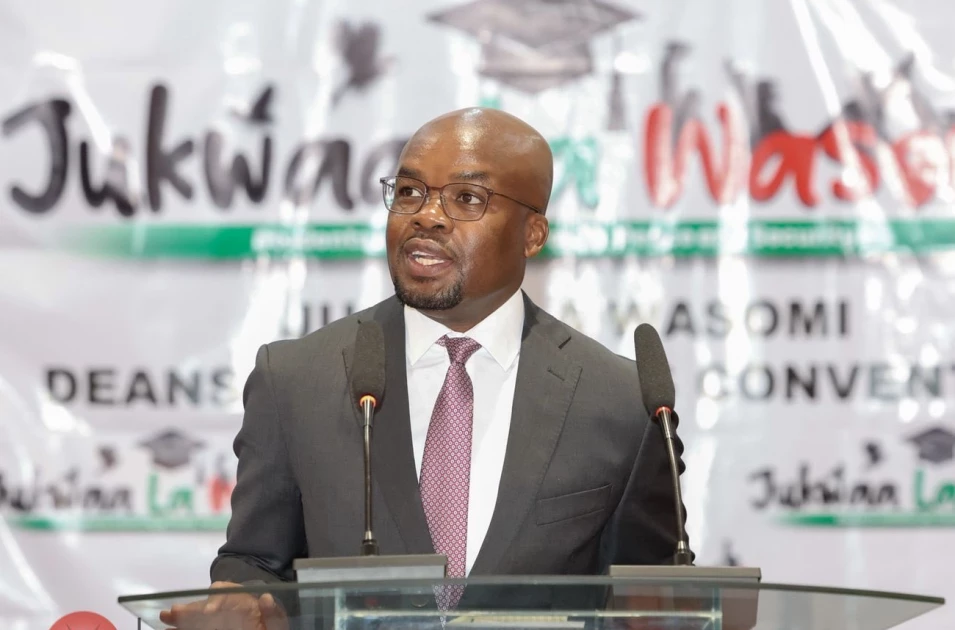Gov't plans to include student leaders in county security committees

Interior PS Raymond Omollo speaks when he presided over the Jukwaa la Wasomi: Deans of Students Convention and Security Agencies Summit on October 6, 2025. PHOTO | MINA

Audio By Vocalize
The government is considering a plan to include student leaders, deans of students, and campus chief security officers in county and sub-county security and intelligence committees, in an effort to ensure that the concerns of students are addressed promptly and effectively.
According to Internal Security and National Administration Principal Secretary Dr.
Raymond Omollo, the proposal is part of a broader plan to strengthen student
participation in security structures and ensure that learning institutions
remain safe spaces for all.
“We must embrace
our student leaders in these structures so that we are able to pick up
information or issues in good time and intervene before problems escalate,” he
said, urging institutions to partner with the National Counter Terrorism Centre
(NCTC) to facilitate regular countering violent extremism (CVE) dialogues.
“Our goal is to
create an ecosystem where learning thrives free from fear, manipulation, or
harm. Security begins with awareness, partnership, and shared responsibility –
and our students must be part of that equation. This is part of our broader
effort to foster stronger partnerships between student leaders and security
agencies, and to create awareness on the role of the youth in promoting peace,”
said the PS.
Speaking during
the Jukwaa La Wasomi series at the University of Nairobi, Dr. Omollo
said the Ministry has partnered with the Universities and Colleges Students’
Peace Association of Kenya (UCSPAK) to enhance engagement between students and
security agencies nationwide.
“We continue to
organize bountiful meetings between student leaders and county security
committees so that we can enhance youth peace and security both at the county
level and nationally,” he added.
The forum brought
together deans of students, university administrators, and representatives from
higher learning institutions, marking the culmination of a series of
discussions highlighting the need for continuous engagement with students on
matters of safety and security.
Participants at
the convention proposed several safety measures, including the installation of
CCTV systems and streetlights around campuses, fencing of institutional
premises, early issuance of student IDs, and involving student leaders in
county-level intelligence and security discussions.
They also called for stronger coordination among universities, security agencies, and communities to mitigate insecurity and foster safer learning environments.
The
Nyumba Kumi model will be expanded to include students living off-campus, while
orientation programs will integrate safety and security briefings.
Among other issues
discussed were drug and substance abuse, insecurity around campuses,
gender-based violence, radicalization, mental health, academic integrity, and
unemployment.
Dr. Omollo
described the rate of gender-based violence in learning institutions as
alarming, noting that about 36 percent of students experience such cases.
“To think that
such cases are being experienced within our institutions of higher learning is
a wake-up call. It is a clear indication that something has gone terribly
amiss. We must therefore find sustainable and collective solutions to address
this challenge and restore safety, dignity, and trust in our learning
environments,” he said.
The forum also
underscored the need for preventive measures against drug and substance abuse,
calling for a standardized national approach by NACADA, more counseling
services, collaboration with parents and community leaders, and tighter
regulation of alcohol and drug advertisements targeting young audiences.
Dr. Omollo further
highlighted the government’s plan to expand the NYOTA Program, a youth
empowerment initiative targeting young people aged 18 to 29 who may not have
progressed beyond secondary education.
“Across all the 47
counties, we are rolling out what we are calling the NYOTA Program, which is
targeting young people between the ages of 18 and 29 years. These are youths
who may not have pursued education beyond Form Four, yet they represent a
significant portion of our population,” he explained.
The program aims
to reach 70 young people in each of the 1,450 wards across the country,
offering them a Ksh.50,000 cash grant to support entrepreneurship and
income-generating ventures while recognizing prior learning, especially
technical skills acquired informally.

Leave a Comment